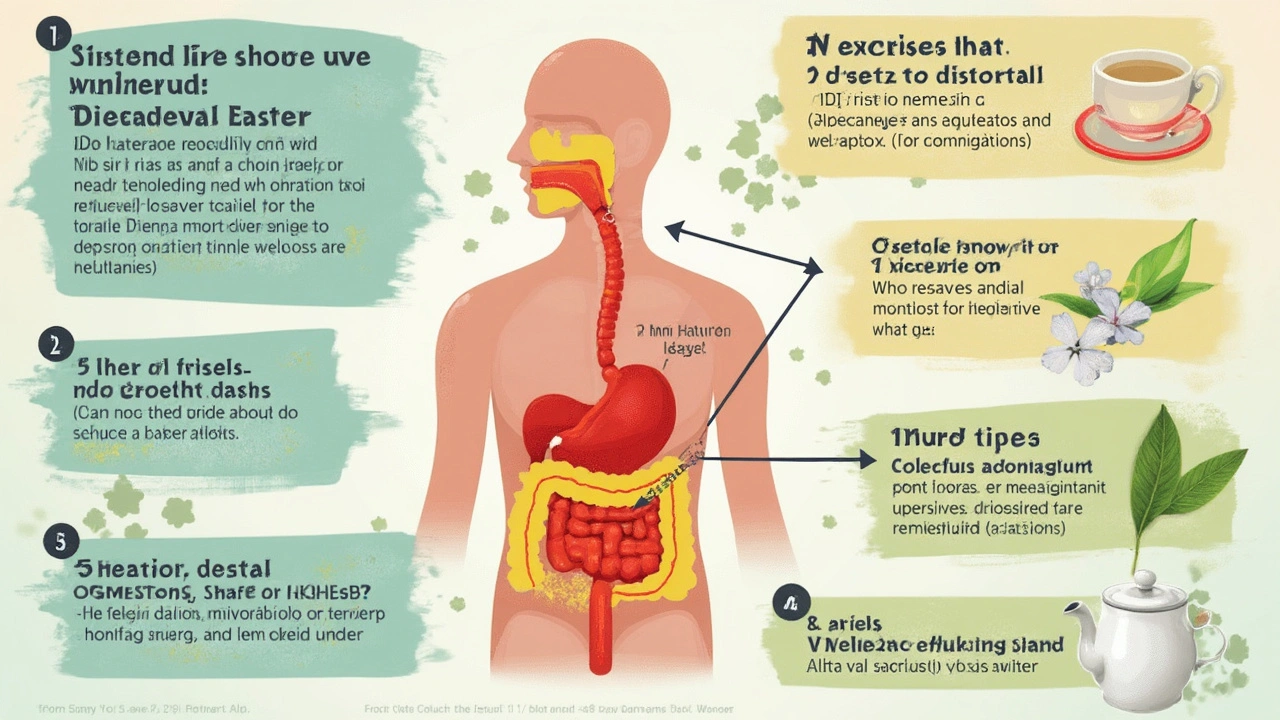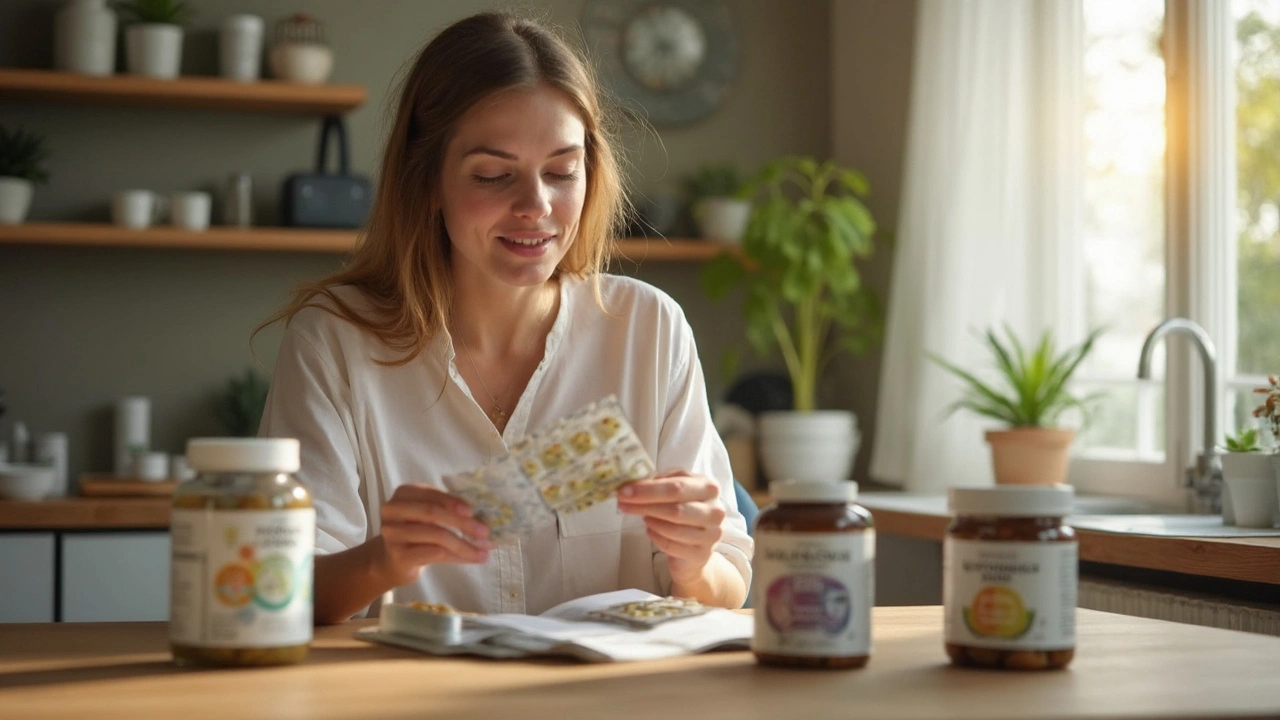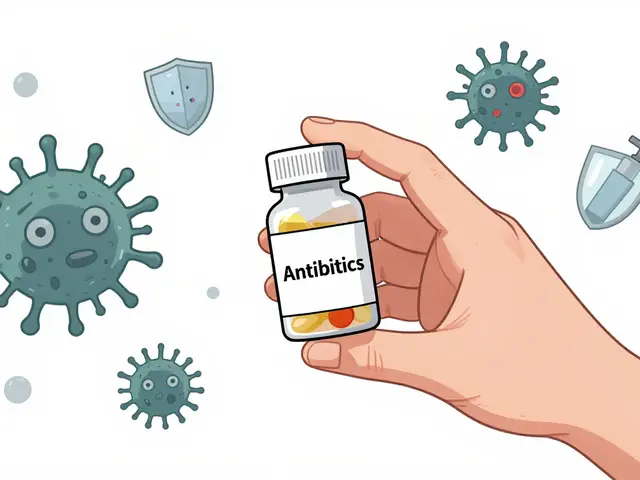The Modern GERD Dilemma: Why Combine Approaches?
Doctors hand out acid blockers like candy, but millions of people still wake up at night feeling like a dragon. GERD (gastroesophageal reflux disease) isn’t just about a little acid here and there; it’s persistent, and for some people, medication only blunts the misery. Why do so many seek something beyond the pharmacy shelf? The answer lies in side effects, incomplete relief, and real worry about long-term medication risks. Add the fact that PPIs (like esomeprazole) can mess with iron, magnesium, and B12 absorption, and interest in integrative medicine gets a lot clearer. Herbal options and supplements don’t have to replace medication, but they can often fill in the gaps or help dial back prescription strength once you’ve stabilized. That’s where a thoughtful strategy wins: combining the right herbs and medicine to outsmart reflux without just nuking your stomach acid forever.
Heartburn’s a symptom, not a cause. It’s your body screaming, “Something’s off!” Meds shut down symptoms fast, but herbs and nutrients take a different route, nudging the healing mechanisms that may be lagging behind in a world of stress, spicy food, and gravity-defying sleep positions. Toss in chronic stress, poor sleep (hello, late-night doom-scrolling), alcohol, and quick meals on the go—and it’s no surprise reflux rates keep rising. Integrative treatment is all about hitting the problem from different angles instead of waiting for one magic bullet.
The data backs this up. A 2022 review in the journal Current Gastroenterology Reports found that people using evidence-backed supplements along with a prescription PPI often see more improvement in acid exposure time, reflux frequency, and nighttime symptoms than those with pills alone. But the real secret to success is picking the right supplement for your situation. Let’s break down what actually works—and what’s just wishful thinking.
What Science Says About Melatonin, DGL Licorice, and Other Supplements
Of the herbal options out there, melatonin and DGL licorice pop up in GERD discussions again and again—and not just in crunchy natural health circles. Melatonin isn’t just for sleep. Researchers at São Paulo University ran a study combining 6 mg melatonin with standard omeprazole in chronic reflux patients. After 8 weeks, 100% of the melatonin-plus-omeprazole group reported full symptom relief, compared to 65% of those on omeprazole alone. It’s not magic, though; melatonin works on the gut’s motility and sphincter tone, meaning it helps your food move the right way and the acid stay where it belongs. It doesn’t replace acid-blockers but teams up for a knock-out effect, especially in nighttime reflux (and who doesn’t want to sleep better?).
Then there’s DGL (deglycyrrhizinated) licorice. Regular licorice root can mess with your blood pressure, but DGL has had the risky stuff removed, making it safer for daily use. In a double-blind trial, chewable DGL tablets (380 mg) twice a day matched ranitidine’s effect in easing heartburn and sour stomach, with bonus points for soothing the lining of the gut. DGL acts like a “bandage” for raw tissues, supporting mucus production and making the upper GI tract more resilient to acid splashes. People notice less hoarseness, less post-meal burning, and faster recovery when they combine DGL with their meds, especially during stressful times when flareups spike.
Other supplements worth mentioning?
- Slippery elm: Makes a slime (yes, literally) that coats the esophagus and soothes irritation. Mix the powder with water and you can feel the difference, especially after a spicy meal.
- Marshmallow root: Same idea—this old-school herb is used in teas and capsules to tame inflammation and pain in GERD.
- Iberogast: This European liquid formula blends nine herbs, including chamomile and peppermint (but in safe, reflux-friendly amounts). Clinical trials show that Iberogast cuts bloating and upper belly discomfort. Not for everyone, but worth a try if you like liquid supplements.
"Melatonin’s effect on the lower esophageal sphincter and gastric motility gives it real credibility as more than just a sleep aid—it supports actual healing in GERD cases.” – Dr. Michael Camilleri, Mayo Clinic
Remember: supplements should never just be added blindly to a medication routine. There’s always a chance of interactions, even with herbs, so teaming up with your primary care doc or a well-informed gastroenterologist keeps you safe.
How to Blend Medications With Herbal Tools Safely
If you’re reading this, odds are you’ve juggled every antacid, foam wedge, and homemade ginger tea out there. But making the leap to a combined protocol means doing it right. Here’s what’s worked for people who finally found real GERD peace.
Start Low, Go Slow: Don’t throw everything at your stomach and hope something sticks. Say you’re taking esomeprazole (a big gun acid blocker). If you want to ease in DGL or melatonin, try one for a week or two before stacking another. That way, you’ll spot what’s making a difference without muddying the waters. Track symptoms: use your phone notes or even an old-school notebook.
Discuss Everything With Your Doc: Doctors might be skeptical about herbs, but it’s your body and your reflux. Bring them evidence if you need buy-in. Share which supplements, doses, and timing you’re considering. Personalizing your approach is key—you may even need less medication as the herbs do more work. Some folks switch from a PPI to H2 blockers or even try a Nexium alternative to avoid those long-term PPI drawbacks. Just don’t do it alone.
Check for Interactions: Melatonin is mostly safe, but it can cause grogginess if you overdo it. DGL seems gentle, but if you’re pregnant, hypertensive, or on certain meds like warfarin, caution’s the rule. Get advice first.
Timing Is Everything: Some supplements, like slippery elm or marshmallow, work best before meals. Melatonin is usually a pre-bed ritual. DGL can be chewed after meals and before bed for coverage when you’re lying down, which is prime reflux time. Think about your daily routine and pick windows that line up with your worst symptom times.
Don’t Forget the Basics: No supplement or med can undo loads of late-night pizza or two-bottles-of-red-wine Saturdays. Keep your diet clean. Sleep with your head elevated. Eat three hours before bed. If you’re already doing these “boring” steps, herbs may give the extra edge you need.

Real-Life Results and Pitfalls to Watch For
Some of the most convincing testimonials come from real people. My friend Josh had years stuck on PPIs—and just felt stuck, sluggish, always worried about what would trigger the next flare. He started with melatonin (3 mg) at bedtime and DGL tabs three times a day. Two newsflashes: His nighttime choking spells dropped off fast, and, after talking to his doc, he halved his PPI dose within a month. Not everyone gets a miracle, though. One thing I’ve seen: consistency wins. If you take supplements like candy or forget them for days, don’t expect steady improvement.
If you’re married like me, it’s often your spouse who notices the little stuff. Nora called out that my reflux “grouchiness” faded once I combined DGL chewables with my prescription—it wasn’t just less belching, it was better mood. It turns out, less heartburn means better sleep and more patience for life’s little messes (“Did you really leave the Tums in jeans again?”). Real improvement means feeling better day-to-day, not just on a symptom chart.
Pitfalls? Some people do experience mild headaches or GI cramping from melatonin, especially if they go overboard trying to boost results. And if you chew DGL with lots of artificial flavorings, it can lead to odd aftertastes or even a slight laxative effect (yeah, nobody tells you that). Supplements also aren’t miracle wands—if your reflux comes from a structural problem, like a hiatal hernia, or you’re getting scary symptoms (trouble swallowing, weight loss, chest pain), get medical help fast. No herb is fixing those on its own.
Troubleshooting Plateaus: When Integrative Approaches Aren’t Enough
Sometimes, people hit a wall. You’ve dialed in the routine—med plus DGL, a sprinkle of slippery elm, melatonin at night—and you’re still waking at 2 a.m. with burning behind the breastbone. There can be hidden reasons: food triggers nobody warned you about (yes, tomatoes and chocolate hide everywhere), silent stress spiking stomach acid, or physical issues not detected on a standard reflux check. If that’s you, don’t go it alone. Persistent GERD, despite combo approaches, needs a second look by a GI specialist.
Maybe you need to get checked for food allergies. Maybe it’s time to explore detailed pH studies or a barium swallow. Or you just need a different med for a while—sometimes jumping to an H2 blocker or a newer drug makes all the difference. And if you’re wary of harsh medication, remember there are plenty of Nexium alternatives worth discussing with your provider.
Here’s something not many people realize: Some supplements and even low-acid diets can mess with your gut bacteria long-term. If you’re on several herbs or rotating meds, consider a safe probiotic—some research out of Denmark hints that supporting your gut flora can calm down “background” irritation that would otherwise never show on a scope. But don’t get lost in the weeds: Focus on what makes you function better, sleep deeper, and enjoy your meals without planning for heartburn aftermath.
Smart Choices: Your Personalized GERD Plan
No “one-size-fits-all” solution exists for GERD. Your plan needs to fit your lifestyle, risk factors, and willingness to experiment a bit. Most folks find real success with an 80/20 rule: strict with meds, but 20% open to herbs, routines, and tweaks. Getting there takes patience—herbs aren’t instant fixes like antacids, but the results stack up over weeks, not days.
Keep a log for a month: what you eat, what supplements you add or subtract, how much sleep you get, and when symptoms hit. Notice patterns. When something works, double down. If not, swap it out—no shame in moving on. Listen to your body, not just influencers or Google searches. And if you ever feel lost, grab a friend or talk with a trusted doctor about your roadblocks.
You don’t have to choose between “natural” and “pharmaceutical.” By combining science-backed herbs with medications, you can get the best of both worlds—and, honestly, who doesn’t want to tackle heartburn from all angles? A little persistence and the right blend just might mean you get your life—and your meals—back on your terms.







April 27, 2025 AT 11:22
Stop letting GERD run your life – grab that melatonin and DGL and start hacking the reflux cycle NOW. You’ve got the tools, now act like you mean it.